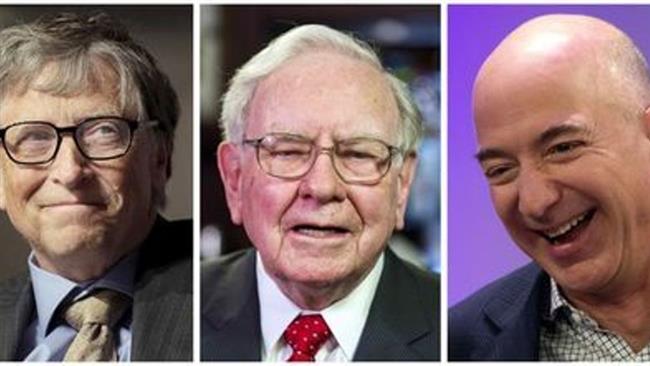American Nightmare: Three richest Americans wealthier than poorest half of US: Study


The three richest people in the United States have collectively more wealth than the bottom half of the US population, or 160 million Americans, highlighting the country’s extreme income disparity, according to a new study.
Jeff Bezos, Bill Gates and Warren Buffett have a combined fortune of $264 billion, the Institute for Policy Studies said in a report, calling the growing wealth gap a “moral crisis” that “threatens our democracy.”
Bezos is worth $95 billion, Gates is worth $90 billion and Buffett is worth $79 billion, according to Forbes’ real-time estimates on Thursday.
America’s top 25 top billionaires have more than $1 trillion in wealth, equivalent to the wealth of 56 percent of the rest of the US population, or 178 million people, the Washington-based think tank said, using data from the most recent Forbes 400 list.
The 400 richest people in the US have a combined wealth of $2.68 trillion and collectively have more than the gross domestic product of Britain, the report said.
“So much money concentrating in so few hands while so many people struggle is not just bad economics, it’s a moral crisis,” said Josh Hoxie, a co-author of the report.
“We have not witnessed such extreme levels of concentrated wealth and power since the first gilded age a century ago,” he added.
“Such staggering levels of wealth inequality threaten our democracy, compound racial and class divisions, undermine social cohesion, and destabilize our economy.”
The report said US President Donald Trump’s proposed tax overhaul would “exacerbate existing wealth disparities” as 80 percent of tax benefits would end up going to the wealthiest 1 percent of households.
“Wealth inequality is on the rise,” said Chuck Collins, an economist and co-author of the report. “Now is the time for actions that reduce inequality, not tax cuts for the very wealthy.”
A widening US wealth gap is moving more American households into either higher- or lower-income groups in major cities.
Numerous studies in recent years have shown that income inequality in the United States has grown significantly since the early 1970s after several decades of stability and scholars have warned about its consequences.
Moreover, the US consistently exhibits higher rates of income inequality than most developed nations in the world, mainly as a result of an unfair tax system and unrestrained capitalism.








